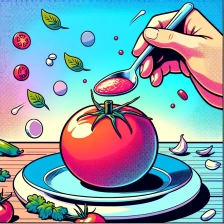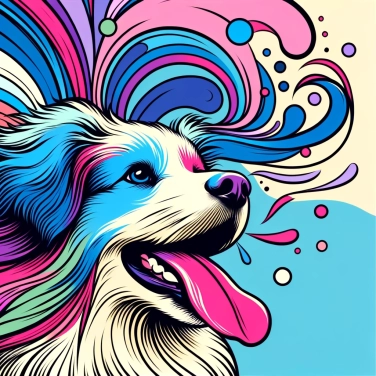In detail, for those interested!
The origin of licking behavior in dogs
Licking is an instinctive behavior in dogs that dates back to their wild ancestors, the wolves. Wolf pups naturally lick their mother's mouth to stimulate the regurgitation of stomach contents, allowing them to feed. This licking behavior is therefore linked to feeding and the survival of the litter. By licking the members of the pack, wolves also strengthen social bonds and group cohesion. This behavior has been retained in domestic dogs and is particularly evident when they lick their owners, who are perceived as members of their "pack". Licking can also be a form of submission and seeking reassurance, with dogs sometimes licking people to express their affection and attachment.
Licking as a means of communication
Dogs use licking as a means of communication with humans and other animals. This behavior dates back to their ancestors, the wolves, who used licking to establish social bonds within the pack. When a dog licks a human, it can be interpreted as a sign of affection, submission, or seeking attention. Licking also allows dogs to strengthen bonds with their fellow dogs, especially within a family group or pack. Puppies learn from a young age to lick their mother and siblings to communicate and establish emotional bonds. Licking is therefore a natural and important behavior for dogs, allowing them to communicate and interact with their social environment.
The causes related to socialization and conditioning.
Licking behavior in dogs can also be influenced by factors related to socialization and conditioning. As puppies grow up, they learn to interact with other dogs and humans, and licking can become a means of social communication. Dogs may lick humans to show their affection and attachment, a behavior they may have learned from a young age by observing interactions between members of their pack. Additionally, licking can be reinforced by positive rewards, which contributes to this persistent behavior. For example, if a dog receives pets or treats when licking a human, they will associate this behavior with a reward and be more likely to repeat it. Conditioning can therefore play an important role in the development and maintenance of licking behavior in dogs.
![Explain why some countries change time zones?]()
![Explain why Alexander the Great refused to wear shoes.]()
![Explain why Alexander the Great always wore an impressive helmet.]()
![Explain why the last Chinese emperor was so young when he came to power?]()





















